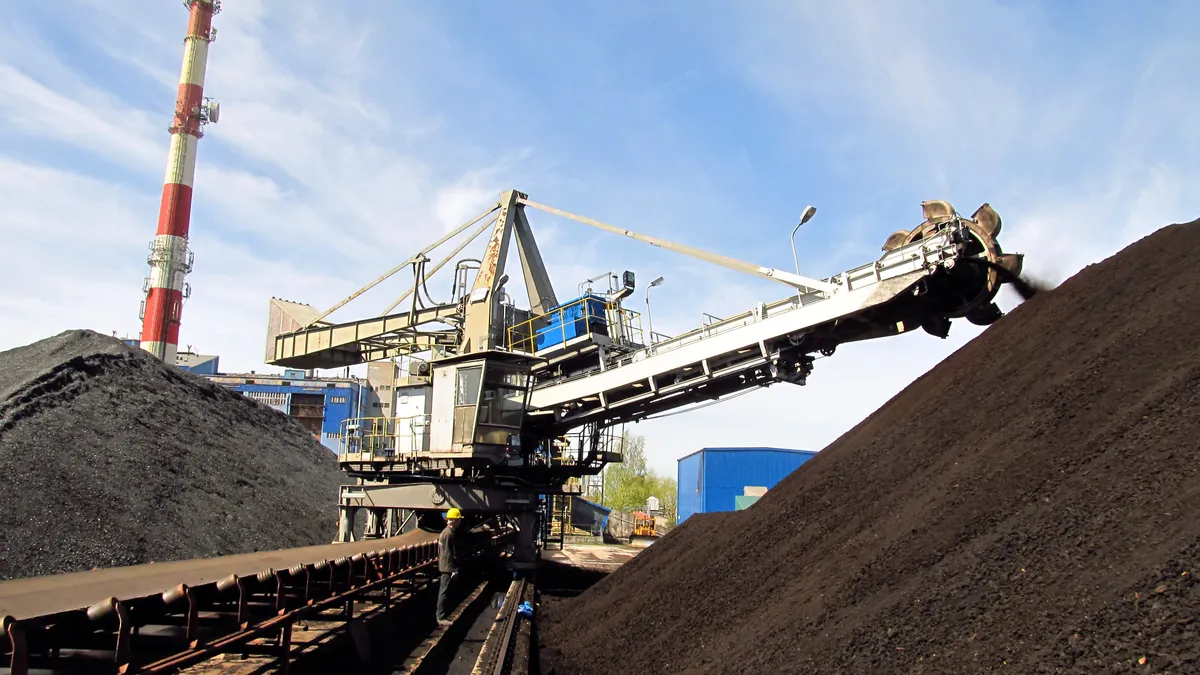Dive Brief
- Coal mining company Murray Energy filed comments with the Federal Energy Regulatory Commission (FERC) asserting that it did not propose the Department of Energy's controversial cost recovery proposal for coal and nuclear plants in wholesale markets.
- The filing came after the publication of photos showing CEO Bob Murray in March delivering a coal "Action Plan" to Secretary of Energy Rick Perry that called for plant payments similar to the DOE's proposal. Environmental groups filed comments last week asking FERC to dismiss the proposal because the text "closely resembled" DOE's eventual proposed rulemaking.
- CEO Murray called the the assertion an "unmitigated lie" and claimed his plan "bears no resemblance whatsoever" to the DOE proposal, though both advocate for plant supports based on on-site plant fuel supplies. DOE officials, including Perry, have also regularly referenced other arguments present in Murray's plan to support their proposal.
Dive Insight
Floated at the end of September, the DOE's Notice of Proposed Rulemaking (NOPR) outlines full cost recovery for merchant generators that have 90 days of fuel supply onsite.
FERC should "ensure that the reliability and resiliency attributes of generation with on-site fuel supplies are fully valued and in particular to exercise its authority to develop new market rules that will achieve this urgent objective," Perry wrote in his letter to FERC announcing the NOPR.
That passage, critics say, closely resembles a central statement in Murray's Action Plan, captured in photographs published by the magazine In These Times at the beginning of December.
"Immediate action needs to be taken to require organized power markets to value fuel security, fuel diversity, and ancillary services that only base load generating assets, especially coal plants, can provide," the plan presented to Perry urged, according to the news outlet.
Environmental groups filed with FERC soon after the photos went public, saying the publication "adds to the weight of evidence that the [NOPR] aims to benefit select companies rather than achieve legitimate statutory aims."
That argument is not a new one. Even before the photographic evidence, former FERC regulators from both parties argued the DOE proposal is simply a "favor" to Trump campaign supporters like Murray and coal generator FirstEnergy.
Murray lashed out at those accusations in a scathing comment filed at FERC on Dec. 26 (emphasis in original):
"That assertion is an unmitigated lie, unsupported by any actual evidence. Murray Energy has never proffered a proposed Grid Resiliency Rule to Secretary Perry or DOE," Murray wrote. "In fact, until DOE published the Rule for comment, Murray Energy never suggested to the Secretary or DOE that the Grid Resiliency Rule be adopted."
Murray argues that its Action Plan statement has "no connection whatsoever" with the DOE NOPR language, saying the two passages "have only two words in common":
Murray argues that should lead the commission to dismiss the "totally lying, scurrilous, and reckless" comments from environmental organizations and evaluate the NOPR "on its merits."
The comments do not address the similar intention of both documents to provide support for coal plants based on fuel security, nor the fact that Perry also used the "fuel diversity" argument to support the NOPR in its original release, writing that it would "ensure the diversity and reliability of generation supply."
Perry and other DOE officials have also referenced the fuel diversity argument present in public appearances. In testimony to the House Energy and Commerce Committee in October, the Energy Secretary argued protecting coal and nuclear plants is necessary to prevent an over-reliance on natural gas that could leave the grid vulnerable to outages. And in November, DOE senior staffer repeated that argument, telling state utility regulators that coal and nuclear plants "came to the rescue" during the Polar Vortex — a prolonged cold snap in January 2014.
"What if they weren't there?" Sean Cunningham, head of the DOE's Office of Energy Policy and Systems Analysis, said. "The loss of generation could have been catastrophic."
FERC is expected to act on the NOPR by Jan. 10 after being granted a 30-day extension by Perry in December.













